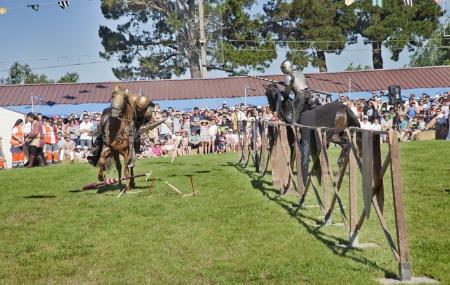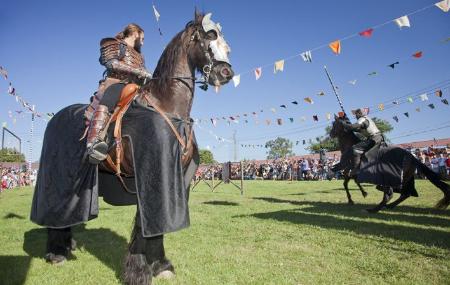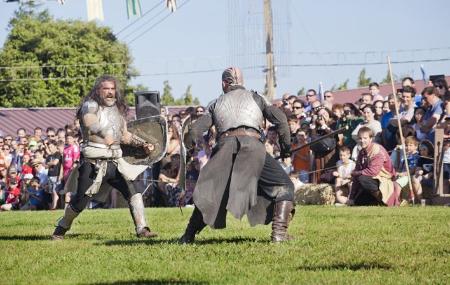
Exconxuraos Festival
- Title Llanera
- Address Locality: Recinto Ferial de Llanera
- Days Days: July (4, 5 and 6)
- Type Type: Festivity of Tourist Interest of the Principality of Asturias
Images
Info
The "Exconxuraos" of Llanera are the commemoration of a historical event that took place in the Council a long time ago and whose commemoration was taken up again by the residents of this central Asturian municipality just over a decade ago.
Around the year 1408, without being able to fix the exact date, the residents of the Council of Llanera, subject to the jurisdictional dominion of the Episcopal see of Oviedo, tired of enduring the "grievances and unreasons" that they received "from some comenderos of Don Guillén", bishop at the time, declared themselves in open rebellion against his authority. As a consequence, they were imposed the severe canonical penalties typical of these cases, pronouncing a sentence of excommunication and interdict on the inhabitants of the rebellious council and all its territory. The people of Llanera, ignoring the coercion, abandoned their position and firmly maintained their rebellion for four years. The bells of the Council's churches fell silent. For four years their doors were to remain closed and the clergymen who served them were to cease to celebrate Sunday services in them and to exercise the care of souls over their parishioners deprived of the consoling last blessing of the Church and the right to receive ecclesiastical burial.
On 17th February 1412, Don Guillén died in Oviedo. Shortly afterwards, in June of the same year, the León-born Diego Ramírez de Guzmán was promoted to the Oviedo chair. On 26th June, when the Dean and the chapter of the Oviedo church met, they conferred full powers on Alvar Fernández, archdeacon of Tineo, Alvar Pérez, chantre, and Alvar Fernández, canon and bachelor of decrees, so that in their name and "with the advice and agreement" of the vicar general of the new prelate in the spiritual and temporal administration of the Church and bishopric of Oviedo, they could adapt the measures aimed at putting an end to the existing tensions between the bishop, Dean and chapter, on the one hand, and "all the omes fillosdalgo e foreros moradores del concello de Llanera" on the other. Two days after the chapter assembly, on Wednesday 27 July, in the presence of several notaries and representatives of the nobility of the region, and having been formally convened by their mayor, the "omes bonos fillosdalgo e foreros de Llanera" met in council in Posada - the geographical centre of the territory - to return to the obedience of D. Diego and his church. The Council appointed its personero Juan Fernández to solemnly declare this firm resolution and the promise not to rebel against their lords "in the aforementioned matters" in the name of all before the delegates of the authorities present at the event.
Once the councillor had complied with this request, the neighbourhood assembly asked the episcopal delegate present there to absolve them of the sentences of excommunication they were under, to lift the interdict that weighed over the whole territory and "to remit any penalties and slander, sacrileges and indecencies and for the said reason they had fallen".
In response to these petitions, the provisor and vicar general of D. Diego and the procurators of the Dean and the chapter showed a generous conciliatory attitude towards the rebels, which manifested itself through a triple declaration of will... In the same way, they were ordered to "as a sign of penitence" to choose thirty good men from among them, twenty noblemen and ten peasants, to go to the Church of San Salvador in Oviedo on a feast day, participating "in the procession of the procession of the rebels", participating "in the procession in sackcloth or doublet without any other covering, each with their own cords and candles in their hands", and the bishop's procurator solemnly undertook to absolve them of the penalties of excommunication and to lift the interdict placed on the council once this public penitential humiliation had been carried out.
The festival is held on the first weekend of July, and has become the festival of Llanera and the people of Llanera as it serves to unite and fraternise all the neighbours as their ancestors did in their day.
The "Exconxuraos" are held at the Llanera fairgrounds, where activities and shows take place throughout the weekend, with the aim of providing a setting that puts visitors in a situation that takes them back to medieval times. Different ribbons, banners, shields, warriors, jesters, knights, musicians, etc., add colour to this medieval festival which is already a reference not only at regional level, but also at national level.




